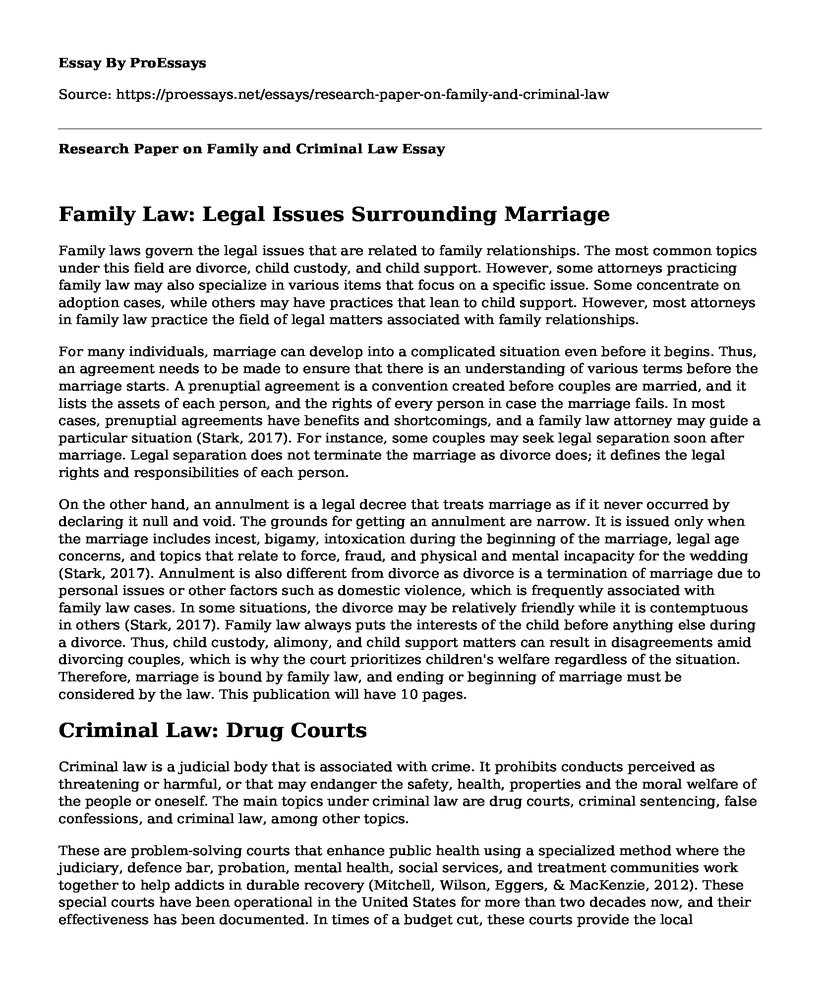Family Law: Legal Issues Surrounding Marriage
Family laws govern the legal issues that are related to family relationships. The most common topics under this field are divorce, child custody, and child support. However, some attorneys practicing family law may also specialize in various items that focus on a specific issue. Some concentrate on adoption cases, while others may have practices that lean to child support. However, most attorneys in family law practice the field of legal matters associated with family relationships.
For many individuals, marriage can develop into a complicated situation even before it begins. Thus, an agreement needs to be made to ensure that there is an understanding of various terms before the marriage starts. A prenuptial agreement is a convention created before couples are married, and it lists the assets of each person, and the rights of every person in case the marriage fails. In most cases, prenuptial agreements have benefits and shortcomings, and a family law attorney may guide a particular situation (Stark, 2017). For instance, some couples may seek legal separation soon after marriage. Legal separation does not terminate the marriage as divorce does; it defines the legal rights and responsibilities of each person.
On the other hand, an annulment is a legal decree that treats marriage as if it never occurred by declaring it null and void. The grounds for getting an annulment are narrow. It is issued only when the marriage includes incest, bigamy, intoxication during the beginning of the marriage, legal age concerns, and topics that relate to force, fraud, and physical and mental incapacity for the wedding (Stark, 2017). Annulment is also different from divorce as divorce is a termination of marriage due to personal issues or other factors such as domestic violence, which is frequently associated with family law cases. In some situations, the divorce may be relatively friendly while it is contemptuous in others (Stark, 2017). Family law always puts the interests of the child before anything else during a divorce. Thus, child custody, alimony, and child support matters can result in disagreements amid divorcing couples, which is why the court prioritizes children's welfare regardless of the situation. Therefore, marriage is bound by family law, and ending or beginning of marriage must be considered by the law. This publication will have 10 pages.
Criminal Law: Drug Courts
Criminal law is a judicial body that is associated with crime. It prohibits conducts perceived as threatening or harmful, or that may endanger the safety, health, properties and the moral welfare of the people or oneself. The main topics under criminal law are drug courts, criminal sentencing, false confessions, and criminal law, among other topics.
These are problem-solving courts that enhance public health using a specialized method where the judiciary, defence bar, probation, mental health, social services, and treatment communities work together to help addicts in durable recovery (Mitchell, Wilson, Eggers, & MacKenzie, 2012). These special courts have been operational in the United States for more than two decades now, and their effectiveness has been documented. In times of a budget cut, these courts provide the local government and the state with a cost-effective way of increasing the number of addict offenders who achieve rehabilitation. Thus, they improve public safety and reduce the costs associated with re-arrest and additional incarceration.
Drug court programs have notable effects on criminal recidivism. A study done by the Department of Justice examined the rates of re-arrests for drug court graduates and found that 84% of graduates from these courts have not been arrested or charged with a severe crime during their first year after graduation, and 72.5% have not been arrested in two years (Mitchell, Wilson, Eggers, & MacKenzie, 2012). Moreover, The Urban Institute found that for every $1 invested in drug courts, a $2.21benefit was received (Mitchell, Wilson, Eggers, & MacKenzie, 2012). The improvements seen in the addict offenders are achieved through intensive treatment and other services that help to recover from addiction for one year, as many offenders commit crime due to addiction. Thus, drug courts are legal facilities bound to criminal law that help heal addiction and thus lowering crimes caused by addiction. This publication will have 8 pages.
References
Mitchell, O., Wilson, D. B., Eggers, A., & MacKenzie, D. L. (2012). Assessing the Effectiveness of Drug Courts on Recidivism: A Meta-Analytic Review of Traditional and Non-Traditional Drug Courts. Journal of Criminal Justice, 40(1), 60-71. Available at: https://www.sciencedirect.com/science/article/pii/S0047235211001255
Stark, B. (2017). International Family Law: An Introduction. Abingdon, UK: Routledge.
Cite this page
Research Paper on Family and Criminal Law. (2022, Feb 11). Retrieved from https://proessays.net/essays/research-paper-on-family-and-criminal-law
If you are the original author of this essay and no longer wish to have it published on the ProEssays website, please click below to request its removal:
- Article Analysis Essay on A Drug That Wakes the Near Dead
- Essay Sample on Creating a Self-Care Plan: Linking Social Justice and Wellbeing
- Paper Example on Criminal Investigation: Balancing Privacy and Law Enforcement
- Research Paper on Death Penalty: Punishment or Revenge?
- Essay Example on Hong Kong-China Divide: Clash of Legal Systems
- Essay Example on Protecting Intellectual Property and Customer Data: Strategies for Modern Businesses
- Racism & Protesting - Free Research Paper Sample







